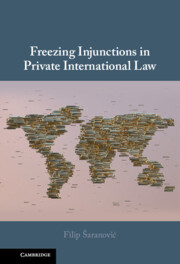Book contents
- Freezing Injunctions in Private International Law
- Freezing Injunctions in Private International Law
- Copyright page
- Contents
- Acknowledgements
- 1 Introduction
- 2 Historical Foundations of Freezing Injunctions
- 3 Theoretical Foundations of Freezing Injunctions
- 4 Theoretical Foundations of Jurisdiction in Private International Law
- 5 Application of Jurisdictional Theories
- 6 Reform Proposals
- 7 The Relationship between Freezing Injunctions and Other Interim Relief
- 8 Conclusions
- Index
3 - Theoretical Foundations of Freezing Injunctions
Published online by Cambridge University Press: 20 October 2022
- Freezing Injunctions in Private International Law
- Freezing Injunctions in Private International Law
- Copyright page
- Contents
- Acknowledgements
- 1 Introduction
- 2 Historical Foundations of Freezing Injunctions
- 3 Theoretical Foundations of Freezing Injunctions
- 4 Theoretical Foundations of Jurisdiction in Private International Law
- 5 Application of Jurisdictional Theories
- 6 Reform Proposals
- 7 The Relationship between Freezing Injunctions and Other Interim Relief
- 8 Conclusions
- Index
Summary
This chapter lays down the foundations for the central argument of the book, that the principle of equipage equality is the primary function of freezing injunctions. This is in contrast to the prevailing, traditional view that freezing injunctions are simply a weapon against unscrupulous defendants and concerned with the enforcement of judgments. In fact, the rules on freezing injunctions, by balancing the rights of the parties, also protect defendants from unnecessary interference with their assets. The principle of equipage equality has important implications for the scope of freezing injunctions. This chapter deals with the implications on their substantive scope. These include issues relating to the basic requirements such as real risk of dissipation of the assets. It is argued that some aspects of the current substantive preconditions of freezing injunctions are inconsistent with equipage equality and that the overall balance created by the substantive preconditions is excessively favourable to the claimant
Keywords
- Type
- Chapter
- Information
- Freezing Injunctions in Private International Law , pp. 63 - 102Publisher: Cambridge University PressPrint publication year: 2022



